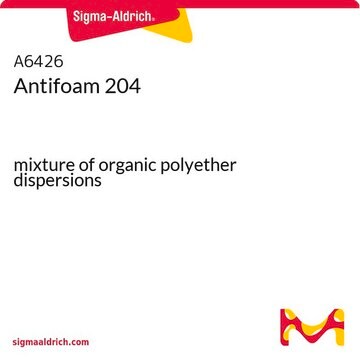A1332
Ammonium citrate tribasic
≥97% (titration)
Synonym(s):
Citric acid triammonium salt
Sign Into View Organizational & Contract Pricing
All Photos(1)
About This Item
Linear Formula:
HOC(CO2NH4)(CH2CO2NH4)2
CAS Number:
Molecular Weight:
243.22
Beilstein:
3779194
EC Number:
MDL number:
UNSPSC Code:
12161700
PubChem Substance ID:
NACRES:
NA.25
Recommended Products
Quality Level
Assay
≥97% (titration)
form
crystals
bp
100 °C (lit.)
mp
185 °C (dec.) (lit.)
density
1 g/mL at 25 °C (lit.)
application(s)
diagnostic assay manufacturing
SMILES string
N.N.N.OC(=O)CC(O)(CC(O)=O)C(O)=O
InChI
1S/C6H8O7.3H3N/c7-3(8)1-6(13,5(11)12)2-4(9)10;;;/h13H,1-2H2,(H,7,8)(H,9,10)(H,11,12);3*1H3
InChI key
YWYZEGXAUVWDED-UHFFFAOYSA-N
Looking for similar products? Visit Product Comparison Guide
Application
- Preparation of One-Emission Nitrogen-Fluorine-Doped Carbon Quantum Dots and Their Applications in Environmental Water Samples and Living Cells for ClO(-) Detection and Imaging.: This study illustrates the role of ammonium citrate tribasic in synthesizing nitrogen-fluorine-doped carbon quantum dots. These quantum dots are used for sensitive detection and imaging of chlorite ions in environmental water samples and living cells, demonstrating a novel application in environmental monitoring and biomedical imaging (Zhang et al., 2023).
- High quantum yield nitrogen and boron co-doped carbon dots for sensing Ag(+), biological imaging and fluorescent inks.: Ammonium citrate tribasic is used here to facilitate the doping process in the synthesis of high quantum yield carbon dots. These dots have applications ranging from heavy metal ion sensing in environmental samples to advanced imaging techniques in biological systems and the creation of fluorescent inks (Cheng et al., 2021).
- Optimization of Copper Stain Removal from Marble through the Formation of Cu(II) Complexes in Agar Gels.: This research employs ammonium citrate tribasic in a novel method for removing copper stains from marble. The study explores the chelating properties of ammonium citrate tribasic to form stable Cu(II) complexes, offering a conservation technique for historical artifacts and buildings (Sansonetti et al., 2021).
- A facile microwave-assisted synthesis of highly crystalline red carbon dots by adjusting the reaction solvent for white light-emitting diodes.: Ammonium citrate tribasic is instrumental in this study for synthesizing red carbon dots under microwave conditions. The dots are used in the development of white light-emitting diodes, showing potential for applications in display technologies and lighting (Lan et al., 2020).
Signal Word
Warning
Hazard Statements
Precautionary Statements
Hazard Classifications
Eye Irrit. 2
Storage Class Code
11 - Combustible Solids
WGK
WGK 3
Flash Point(F)
Not applicable
Flash Point(C)
Not applicable
Personal Protective Equipment
dust mask type N95 (US), Eyeshields, Gloves
Choose from one of the most recent versions:
Already Own This Product?
Find documentation for the products that you have recently purchased in the Document Library.
Customers Also Viewed
David Lubkowicz et al.
ACS synthetic biology, 7(5), 1229-1237 (2018-04-14)
Gram-positive Staphylococcus aureus infection that results in pneumonia, urinary tract infection, and in severe cases, sepsis, has recently been classified as a serious threat to public health. Rapid and cost-effective detection of these infections are costly and time-consuming. Here, we
Carolyn R O'Brien et al.
Journal of feline medicine and surgery, 19(5), 498-512 (2017-04-26)
This paper, the first in a series of three on 'feline leprosy', provides a detailed description of disease referable to Candidatus 'Mycobacterium tarwinense', the most common cause of feline leprosy in Victoria, Australia. Cases were sourced retrospectively and prospectively for
Kiyohito Totsuka et al.
Experimental eye research, 181, 316-324 (2018-09-02)
The dysfunction and cell death of retinal pigment epithelial (RPE) cells are hallmarks of late-stage dry (atrophic) age-related macular degeneration (AMD), for which no effective therapy has yet been developed. Previous studies have indicated that iron accumulation is a source
Kouhei Mizuno et al.
Scientific reports, 7(1), 12880-12880 (2017-10-19)
In certain conditions, members of the Lactobacillus genus are auxotrophs that have fastidious requirements for growth. Notably, Lactobacillus cannot grow in M9 medium, a minimal synthetic medium used for Escherichia coli. However, we found that some Lactobacillus strains can be
Jin Zhang et al.
Journal of colloid and interface science, 529, 11-22 (2018-06-08)
A novel nitrogen doped carbon quantum dots (N-CQDs) mediated Ag3PO4/BiVO4 Z-scheme photocatalyst was synthesized through a solvothermal-precipitation method. The as-prepared photocatalysts were comprehensive characterized by X-ray diffraction, X-ray photo-electron spectroscopy, scanning electron microscopy, transmission electron micrograph, UV-vis diffuse reflection spectroscopy
Our team of scientists has experience in all areas of research including Life Science, Material Science, Chemical Synthesis, Chromatography, Analytical and many others.
Contact Technical Service









